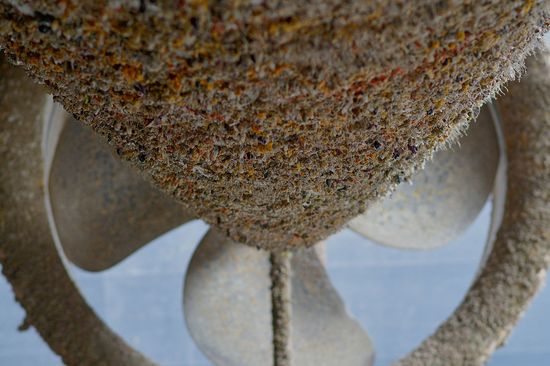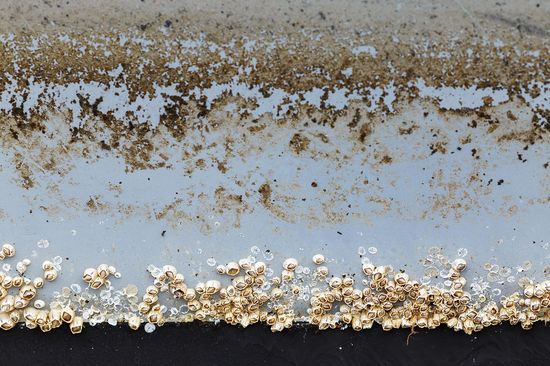ZIM anti-fouling network: Innovative solutions to biofouling problems

Ship hulls are often exposed to fouling by microorganisms, plants, algae and animals. This process, known as biofouling, leads to the introduction and spread of non-native species in foreign waters, and it also increases the flow resistance of the ships, resulting in an increased energy consumption. In addition to longer travel times, this also leads to significantly higher fuel costs. Effective anti-fouling systems can counteract the fouling process. Improved hydrodynamic properties, fuel savings, reduced transport costs as well as a reduction in environmentally harmful emissions are all possible results. Applying effective anti-fouling systems makes sense from an economic point of view and is in the interest of the environment. To this end, however, it will be crucial to develop innovative solutions.
In order to develop solutions against biofouling on underwater surfaces, a total of 21 small and medium-sized enterprises and research institutions have joined forces to form a ZIM innovation network, creating a promising pool of expertise in the field of anti-fouling. The Zentrales Innovationsprogramm Mittelstand (ZIM - central innovation programme for small and medium-sized enterprises) of the Federal Ministry for Economic Affairs and Climate Action helps companies implement innovative project ideas with suitable funding programmes. The ZIM anti-fouling network is intended to serve as an expert platform for the development of innovative products and processes for the nature-friendly prevention of fouling on surfaces in a maritime environment. The Maritime Cluster Northern Germany (MCN) and the MCN member EurA AG submitted the application together in May 2021. The ZIM network was approved at the beginning of October 2021. The project is expected to have a duration of 4.5 years.
Wide-ranging selection of skills for joint solutions
The ZIM anti-fouling network combines various specialist competencies with a shared focus on anti-fouling in maritime and inland shipping and offshore units. The range of services offered by the members of the network includes systems for preventive measures such as material applications—for example lacquers, resins, coatings or foiling—and after-the-fact cleaning techniques using laser or ultrasound technologies as well as mechanical cleaning systems. All this is complemented by expertise in environmental science, biology and state-of-the-art inspection, measurement and testing facilities. Its associated members support the network by keeping an eye on regulations and restrictions while also facilitating additional contacts beyond the network. On the part of the research facilities, prestigious institutes represent the current state of research and development in relevant subject areas and they contribute to the realisation of scientific, innovative projects. This arrangement promotes both rapid access to networking and technically profound developments.
A total of seven small and medium-sized enterprises have joined the network. In addition to the MCN members Sea & Sun Technology and Dr. Brill + Partner the companies Bioplan, BAJO Coatings, Laserline, MaRenate and EBF Innovation are part of the network.
The research partners include the MCN members, the Alfred Wegener Institute for Polar and Marine Research, Fraunhofer IFAM, Fraunhofer CML, Fraunhofer IOF and the Laser Center Hannover.
Some international companies have also joined the network: Netherlands Maritime Technology and Propulsion and Maritime Services from the Netherlands and Subsea Industries from Belgium.
As associated members of the network, the German Federal Maritime and Hydrographic Agency, the DIN Standards Committee, IAV and the Maritime Cluster Northern Germany add their expertise to the project. MCN will actively support the search for further partners and users while seeking to promote the understanding of anti-fouling as an important instrument against the biofouling of underwater surfaces.
The network is supported by the consulting firm for innovation and technology, EurA AG. Together with network partners, the MCN member company will develop innovative projects, acquire funding and support the handling of funded projects.
Spotlight: fouling on underwater surfaces

The ZIM network is focusing on fouling on the underwater surfaces of ships and offshore installations, as this is where most fouling occurs and where the greatest benefits can be achieved. Biofouling is not limited to large hulls. Other ship components are generally affected and in some cases much more difficult to clean. Stationary systems are also affected, however, such as offshore installations. Wind turbine foundations, for example, are affected by biofouling, where it increases hydrodynamic loads. These installations are often irregularly attended to, and as a result, sustained fouling protection is needed to maximise the service life of such investments over the long term. The same applies to locks in inland waterways. Some are exposed to such rapid fouling that their functional efficiency is considerably impaired. This is exacerbated by the fact that simple recoating is usually not possible, as the surfaces are permanently submerged. The aim of the network is to develop effective and efficient materials, methods and systems for the prevention and subsequent removal of underwater fouling under environmentally compatible aspects.
